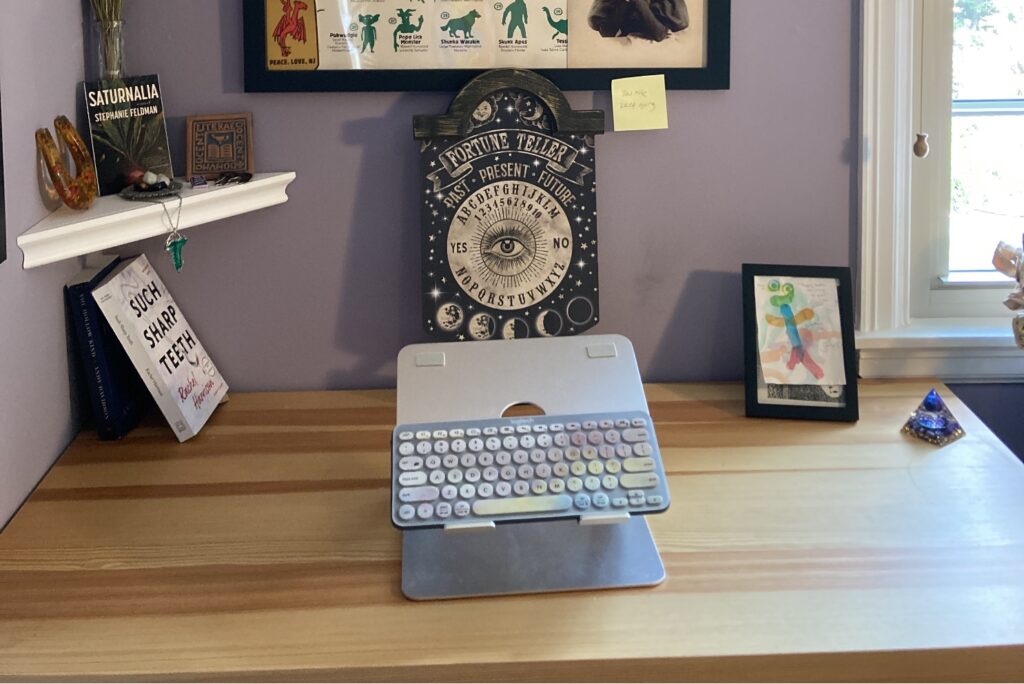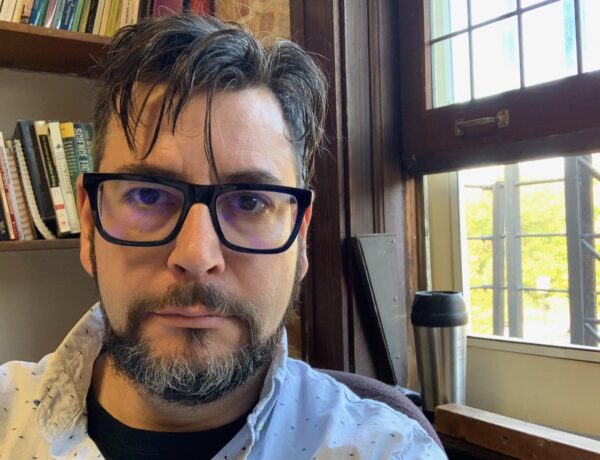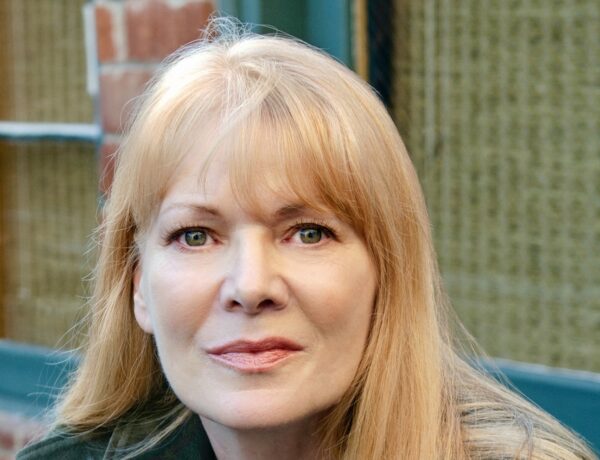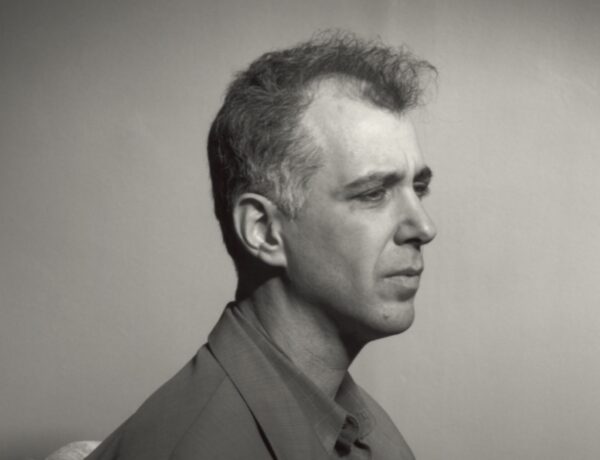Stephanie Feldman is the author of the novels Saturnalia and The Angel of Losses, a Barnes & Noble Discover Great New Writers selection, winner of the Crawford Fantasy Award, and finalist for the Mythopoeic Award.
She is co-editor of the multi-genre anthology Who Will Speak for America? and her stories and essays have appeared in or are forthcoming from Asimov’s Science Fiction, Catapult Magazine, Electric Literature, Flash Fiction Online, The Magazine of Fantasy & Science Fiction, The Rumpus, Uncharted Magazine, Vol. 1 Brooklyn, Weird Horror, and more. She lives outside Philadelphia with her family.
Each week, we publish a new daily writing routine from a famous author. Subscribe to our newsletter so you don’t miss out!
Hi Stephanie! We’re delighted to have you as a guest on Famous Writing Routines. For our readers who may not be familiar with your work, could you please give us a brief introduction to yourself?
I’m a Philly-based author of genre-bendy fiction. My most recent novel, Saturnalia, is set in a near-future world of climate catastrophe and occult conspiracies. My first novel, The Angel of Losses, is about two sisters investigating their late grandfather’s mysterious fairy tales, and their family’s secret history.
Can you speak to your experience as a co-editor of the multi-genre anthology “Who Will Speak for America?” and how that may have influenced your writing?
I direct most of my writing energy and time to fiction. Co-editing this volume reminded me how important it is to work in other genres. I solicited, edited, and organized essays, short stories, poetry, polemic, and graphic art; I also co-wrote the introduction, about creating art in a time of political crisis. I believe that reading and writing in multiple genres sharpens our skills and disrupts the patterns our thinking and prose have settled into.
It’s also so rewarding to build relationships with other writers, and important to share our platforms. I came into this project upon the invitation of my co-editor, Nathaniel Popkin; our initial, prominent contributors helped us secure a publisher; and the book became an outlet for some early-career contributors, many of whom have since had great success.
I’d love to hear more about your experience of winning the Crawford Fantasy Award and being a finalist for the Mythopoeic Award for your novel The Angel of Losses? How did those achievements impact your writing career?
That recognition had a huge impact on my career. It invited me into the genre literature community, where I found so many writers and readers with the same sensibility—people who love ghosts and folklore and magic. It also encouraged me to lean into the fantastic in my work. I don’t think I’d have published my short stories, or perhaps written Saturnalia, if I hadn’t learned to think of myself as a fantasy writer.
How do you decide on what to write about and how do you go about researching and preparing to write a piece?
Ideas come to me all the time, and I keep a list of possibilities for short stories and novels. I love having those next projects on the horizon. They keep me motivated: If I can finish this messy, difficult piece, I can move on to the next shiny story. (Which in time, of course, becomes its own swamp.)
I love to begin with research, especially nonfiction reporting. Learning more about a subject, place, or event sparks my imagination. I try not to over-research, though, which can make me feel beholden to my notes, when really the best thing is to let the story develop from the character’s problems and emotional needs.
I always outline, both for short fiction and novels. It helps me identify a clear conflict and confirm I have enough obstacles and possible action for my characters. My stories often depart from these plans, but I need that running start to get me through a complete draft.
Discover the daily writing habits of authors like Stephen King, Neil Gaiman, and Gillian Flynn with Famous Writing Routines Vol. 1 and learn how to take your writing to the next level. Grab your copy today!
Can you discuss any recurring themes or motifs in your writing and how you explore those themes in your work?
I write a lot about gender and power, and women’s relationships with each other. The Angel of Losses is about sisters; Saturnalia follows two former best friends at war; and my work in progress is about mothers and daughters.
Looking back on the last few years, I’ve also written a lot about water, winter, and creatures somewhere between human and inhuman. I’m not sure what all of this means! Or if I even need to find an answer. Writing a successful story requires a lot of critical thinking, but I’m trying to honor the mystery in my work, too.
What does a typical writing day look like for you?
I don’t have a typical writing day. My schedule is made up of freelancing, teaching, and childcare, and changes season to season, even day to day. I have periods where I can focus mainly on writing, but more often I’m fitting writing in to my schedule like a puzzle piece. It’s counterintuitive—and fortunate—that the busy times tend to be my most creatively productive. Maybe because they force me to be disciplined and really make the most of the minutes I can devote to writing.
Do you have any specific rituals or habits that you follow before beginning to write?
I usually write early in the day. I have the most mental energy in the morning, and my attention hasn’t been pulled in too many directions yet. I often return to the same location—my home desk, my dining table, a certain coffee shop—again and again, until I suddenly feel stuck and need a new view.
I’ll also listen to the same album or playlist, a kind of Pavlovian trick. While writing Saturnalia, I listened to the War on Drugs’ album Lost in the Dream over and over. Recently, I’ve been playing Christine and the Queen’s Redcar les adorables étoiles. Something with momentum and quiet or non-English vocals. Korean hip hop has treated me well. Turning on my writing soundtrack helps me return quickly to the world of the story.
Oh, and of course, I always start with coffee.
Can you speak to any advice you would give to aspiring writers on developing a consistent and productive writing routine?
Give yourself manageable goals: 15 minutes, 100 words, a paragraph. That releases some pressure. Often, you’ll end up writing way more, and if you don’t, you’re still moving forward. For me, while working to complete a draft or chunk of revision, it’s very helpful to write every day. It allows me to keep my head in the game, so I can jump back into a text and make the most of the time I have. Even one sentence counts as a day’s writing.
What does your current writing workspace look like?
I have a writing desk in our spare bedroom, and the corner is decorated with publishing mementos—magazine and book covers—and creative and sentimental items, like pictures from friends and a champagne bottle from my Saturnalia launch party.
I may redecorate soon—I have some new pieces to hang up, including a print of Rousseau’s Carnival Night, which is also featured in Saturnalia—but for now, the central focus is a map of North American cryptids. I’ve written a couple stories that draw on local folklore, but mostly it captures my love for finding the weird things (real and imagined) that coexist with our ordinary world.

Affiliate disclaimer: Some links on this website are affiliate links. We may earn a small commission if you make a purchase through these links, but only promote products we truly believe in. We disclose affiliate links and give honest reviews.



No Comments